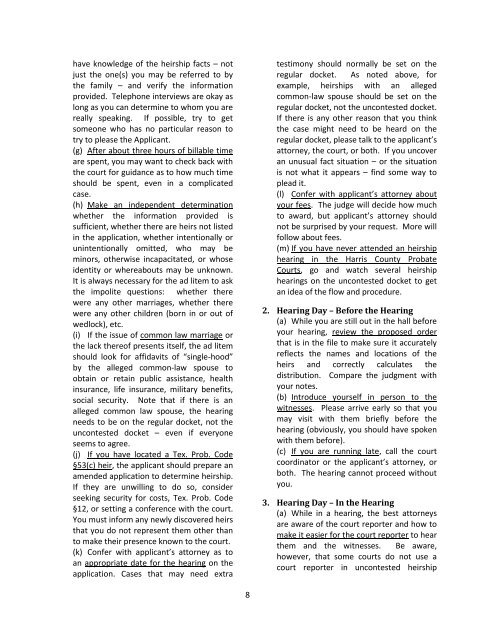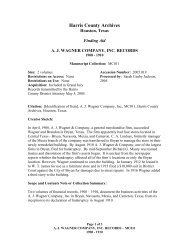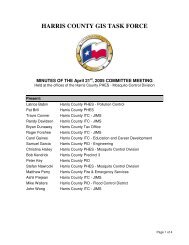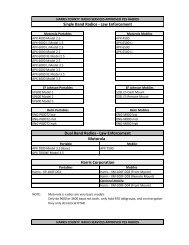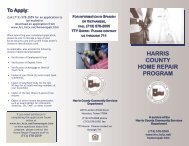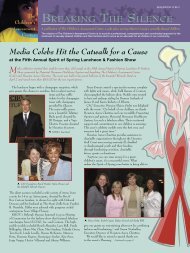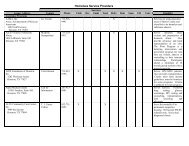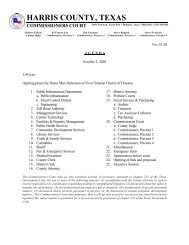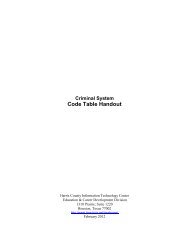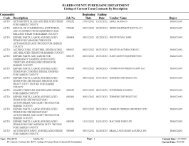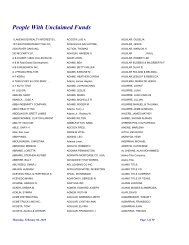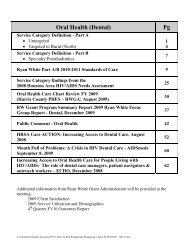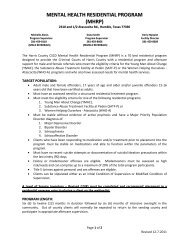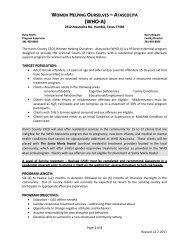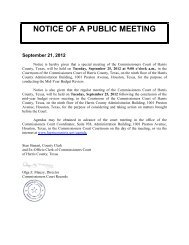Harris County Probate Courts The Ad Litem Manual for Heirship ...
Harris County Probate Courts The Ad Litem Manual for Heirship ...
Harris County Probate Courts The Ad Litem Manual for Heirship ...
You also want an ePaper? Increase the reach of your titles
YUMPU automatically turns print PDFs into web optimized ePapers that Google loves.
have knowledge of the heirship facts – not<br />
just the one(s) you may be referred to by<br />
the family – and verify the in<strong>for</strong>mation<br />
provided. Telephone interviews are okay as<br />
long as you can determine to whom you are<br />
really speaking. If possible, try to get<br />
someone who has no particular reason to<br />
try to please the Applicant.<br />
(g) After about three hours of billable time<br />
are spent, you may want to check back with<br />
the court <strong>for</strong> guidance as to how much time<br />
should be spent, even in a complicated<br />
case.<br />
(h) Make an independent determination<br />
whether the in<strong>for</strong>mation provided is<br />
sufficient, whether there are heirs not listed<br />
in the application, whether intentionally or<br />
unintentionally omitted, who may be<br />
minors, otherwise incapacitated, or whose<br />
identity or whereabouts may be unknown.<br />
It is always necessary <strong>for</strong> the ad litem to ask<br />
the impolite questions: whether there<br />
were any other marriages, whether there<br />
were any other children (born in or out of<br />
wedlock), etc.<br />
(i) If the issue of common law marriage or<br />
the lack thereof presents itself, the ad litem<br />
should look <strong>for</strong> affidavits of “single-hood”<br />
by the alleged common-law spouse to<br />
obtain or retain public assistance, health<br />
insurance, life insurance, military benefits,<br />
social security. Note that if there is an<br />
alleged common law spouse, the hearing<br />
needs to be on the regular docket, not the<br />
uncontested docket – even if everyone<br />
seems to agree.<br />
(j) If you have located a Tex. Prob. Code<br />
§53(c) heir, the applicant should prepare an<br />
amended application to determine heirship.<br />
If they are unwilling to do so, consider<br />
seeking security <strong>for</strong> costs, Tex. Prob. Code<br />
§12, or setting a conference with the court.<br />
You must in<strong>for</strong>m any newly discovered heirs<br />
that you do not represent them other than<br />
to make their presence known to the court.<br />
(k) Confer with applicant’s attorney as to<br />
an appropriate date <strong>for</strong> the hearing on the<br />
application. Cases that may need extra<br />
8<br />
testimony should normally be set on the<br />
regular docket. As noted above, <strong>for</strong><br />
example, heirships with an alleged<br />
common-law spouse should be set on the<br />
regular docket, not the uncontested docket.<br />
If there is any other reason that you think<br />
the case might need to be heard on the<br />
regular docket, please talk to the applicant’s<br />
attorney, the court, or both. If you uncover<br />
an unusual fact situation – or the situation<br />
is not what it appears – find some way to<br />
plead it.<br />
(l) Confer with applicant’s attorney about<br />
your fees. <strong>The</strong> judge will decide how much<br />
to award, but applicant’s attorney should<br />
not be surprised by your request. More will<br />
follow about fees.<br />
(m) If you have never attended an heirship<br />
hearing in the <strong>Harris</strong> <strong>County</strong> <strong>Probate</strong><br />
<strong>Courts</strong>, go and watch several heirship<br />
hearings on the uncontested docket to get<br />
an idea of the flow and procedure.<br />
2. Hearing Day – Be<strong>for</strong>e the Hearing<br />
(a) While you are still out in the hall be<strong>for</strong>e<br />
your hearing, review the proposed order<br />
that is in the file to make sure it accurately<br />
reflects the names and locations of the<br />
heirs and correctly calculates the<br />
distribution. Compare the judgment with<br />
your notes.<br />
(b) Introduce yourself in person to the<br />
witnesses. Please arrive early so that you<br />
may visit with them briefly be<strong>for</strong>e the<br />
hearing (obviously, you should have spoken<br />
with them be<strong>for</strong>e).<br />
(c) If you are running late, call the court<br />
coordinator or the applicant’s attorney, or<br />
both. <strong>The</strong> hearing cannot proceed without<br />
you.<br />
3. Hearing Day – In the Hearing<br />
(a) While in a hearing, the best attorneys<br />
are aware of the court reporter and how to<br />
make it easier <strong>for</strong> the court reporter to hear<br />
them and the witnesses. Be aware,<br />
however, that some courts do not use a<br />
court reporter in uncontested heirship


